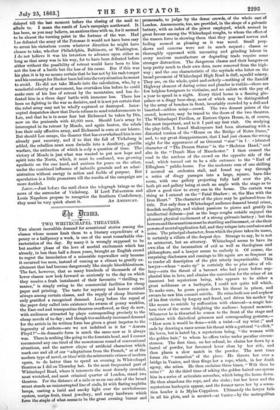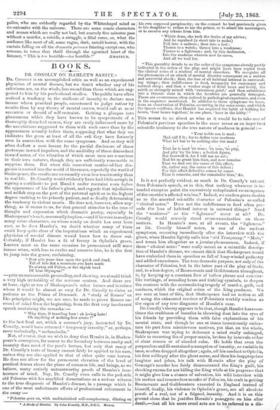ght alnuna.
—4-- TWO WHITECHAPEL THEATRES.
THE almost incredible demand for sensational stories among the classes whose means limit them to a literary expenditure of a penny or a halfpenny a week, is one of the most remarkable cha- racteristics of the day. By many it is wrongly supposed to be but another phase of the love of morbid excitement which has already, in less than half a dozen years, brought an English crowd to regret the immolation of a miserable ropewalker only because it occurred too soon, instead of coming as a climax to gratify ex- citement that had become dangerously like simple bloodthirstiness. The fact, however, that so many hundreds of thousands of the lower classes now look forward so anxiously to the day on which they receive a fresh instalment of their favourite "thrilling ro- mance," is simply owing to the commercial facilities for cheap paper and printing. The taste for mystery and horror existed always among certain classes, and the supply of cheap literature only gratified a recognized demand. Long before the repeal of the paper duty called into existence the swarm of penny weeklies, • the East-end and transpontine theatres overflowed, as they do now, with audiences attracted by plays corresponding precisely to the cheap novels of to-day ; and though the suddenly increased demand for the article in its written form has given a great impetus to the ingenuity of authors—are we not indebted to it for "Aurora Floyd ?"—its dramatic form is much the same now as it always was. There is nothing like going to the fountain head, and I cannot recommend any one tired of the monotonous round of conventional situations, and the narrow clique of artificial characters which • mark one and all of our "adaptations from the French," or of the modern type of novel, or blasé with the aristocratic crimes of modern opera, to do better than to spend an evening in Whitechapel theatres as I did on Thursday last. In the most frequented part of Whitechapel Road, where it intersects the most densely crowded, most wretched, and most criminal quarter of London, stand two theatres. For the distance of a mile or so on one side of the broad street stands an uninterrupted line of stalls, lit with flaring naphtha lamps, casting a lurid and smoky light over the unwholesome oysters, unripe fruit, tinsel jewellery, and rusty hardware which form the staple of what seems to be the great evening bazaar and
police, who are evidently regarded by the Whitechapel mind as co-extensive with the universe. There are some comic characters and scenes which are really not bad, but scarcely five minutes pass without a murder, a suicide, a struggle, a filial curse, or, what the audience like most of all, some vague, dark, untold horror, with the curtain falling on all the dranaatis persona fainting except one, who screams, in tones that thrill through the agonized heart of the listener, "This is too horrible—too horrible !" AMATEUR.































 Previous page
Previous page